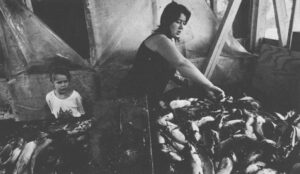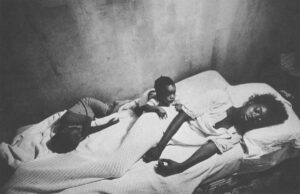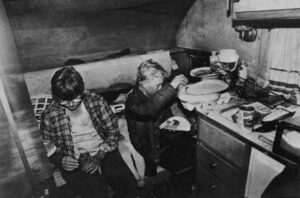Stephen Shames
- 1985

Fellowship Title:
- Child Poverty in America
Fellowship Year:
- 1985

Women, Children and Poverty
Women, children and poverty. Women and children equal poverty. A child raised by his mother alone is four times as likely to be poor as a child with both parents at home. In fact, more than half the children in female-headed families are poor. The rate is two-thirds in such black families. But having two parents at home is no guarantee. Seven million of our 14 million poor children lived in “male present” homes. The rate of two parent poor families is rising. Nor does a full time job guarantee affluence. More than 2.5 million children were poor in 1983 even though a parent worked full time year round. That is 17%–nearly one-fifth–of all poor children. Divorce, on the other hand, means instant poverty for half of the children involved. More than four million poor children have separated or divorced parents. Nobody has accurate statistics on how many millions of men do not pay their court-mandated child support, even though they have jobs. So welfare pays, while the children grow up poor. Spring Semple would

Child Poverty in Chicago
Chicago, America’s third largest city, is a case study in urban poverty. Chicago contains ten of the nation’s sixteen poorest neighborhoods, according to Roosevelt University urbanologist Pierre DeVise. One half of all children in the city are poor. The past two years have seen a dramatic increase in poverty and its effects. One of these “effects” is hunger. Malnutrition and hunger are evident. The Mayor’s Task Force on Hunger reported in October, 1984 that up to 50% of the infants of poor women studied at Chicago hospitals suffered from iron deficiency, caused by inadequate nutrition, which can lead to permanent behavioral and neurological disorders. Dr. Katherine Christoffel of The Children’s Memorial Hospital told me her hospital has documented sixteen cases of marasmus and kwasiorkor, which are starvation-related diseases, in the past four years. Generally these Third World diseases are not looked for. “If we kept good records, we would probably be shocked,” she said. Infant mortality is high. Dr. Howard Levi, Head of Pediatrics at Mt. Sinai Hospital, believes infant mortality in Chicago’s west side

The Farm Crisis
“It’s pure hell, I’ll tell you.”–Dave Dumont The Dumont family of Wellman, Iowa, is fighting to keep their farm. Jason (14) and Rodney (12) help their father. Linda drove out to the fields to bring her husband, Dave, the latest news from the banker. Dave talks to his banker during lunch break. The banker doing an inventory of equipment and livestock. The Dumonts are trying to negotiate a settlement of their debt with the bank to avoid bankruptcy. Dave and Linda Dumont have raised hogs and grown corn for fifteen years. Dave is the fourth generation to work the land. Family farming is more than a job to them. It is a way of life that mixes long hours of hard work with close family living linked to their strong religious values. All three children help on the farm. Jason (14) and Rodney (12) work in the fields and have their own hogs to raise. The Dumonts are in financial trouble. All year they have been fighting to keep their farm. They, like thousands of

Child Poverty in America: The Homeless Families
California is the homeless capital of America. Ventura County–an affluent, suburban area, next to Los Angeles County–has between three and five thousand homeless. According to a survey by the Ventura County Coalition for the Homeless, one-third of the homeless are children under age 13. 17% are under 5. Half the homeless are families. 20% have jobs. 40% are unemployed (half lost jobs in the last six months). Only 22% are on welfare. Most are not drifters. Two-thirds lived in the county for at least a year. 88% lost their homes for financial reasons. Once homeless, it is difficult to recover. To move into a home, first and last months’ rent plus a security deposit is required. Imagine yourself homeless. How do you save money? Without proper cooking facilities, you spend more on food. Motels are expensive. So you sleep in your car. You need to find a job. But how do you look for work if you can’t shower? You apply for welfare and find out you need a mailing address. Do you say you
